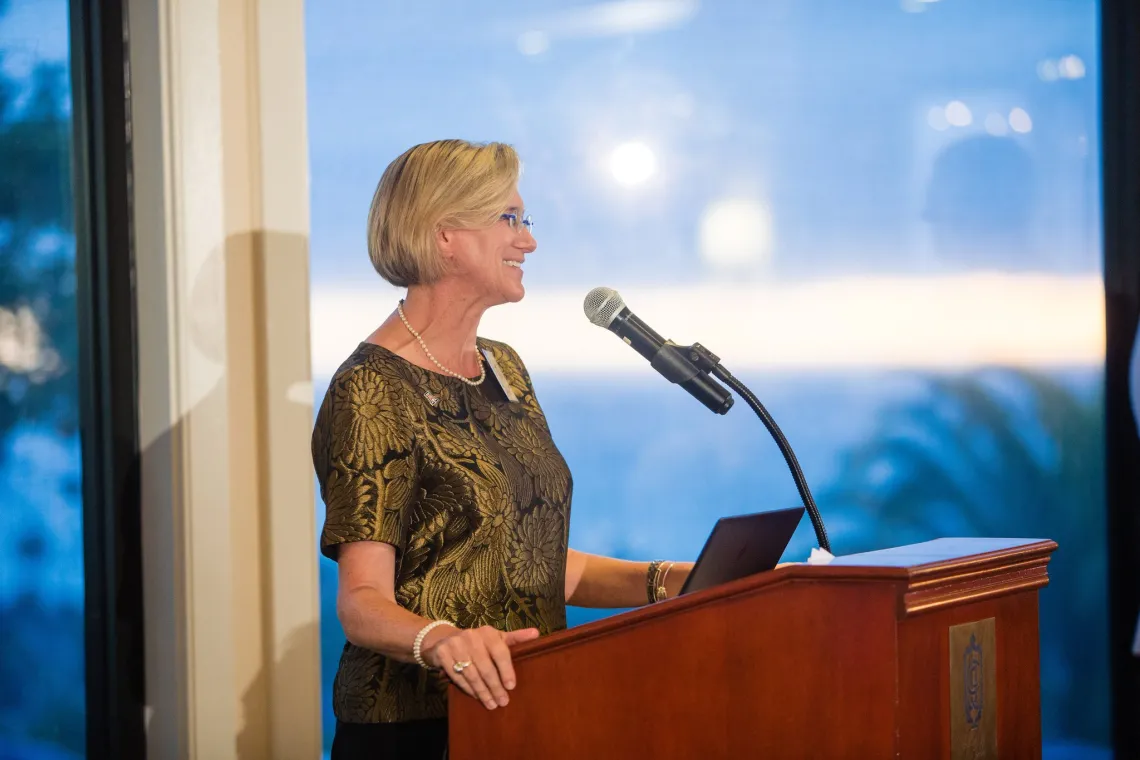Forging Ahead with Provost Folks

By Elizabeth Labiner
Dr. Liesl Folks, the new Senior Vice President for Academic Affairs and Provost at the University of Arizona, joined us in Tucson after a highly successful tenure as Dean of the School of Engineering and Applied Sciences at the University of Buffalo. While at Buffalo, Provost Folks oversaw impressive growth of the engineering program and advocated for minorities and women in STEM. Her focus on growth, supporting graduate students, and successful completion of degrees across graduate fields contributed to an exciting generative energy in the university’s administration.
One area in which she sees enormous potential for development is in the expansion of graduate-level curriculum, including courses that would lend themselves to graduate-level certificates and professional development. “I think there is a niche for more bite-sized but directly relevant curriculum, much of which would be stackable, to build skills and competencies that graduate students need for their fields,” Provost Folks explains. She also cites improving our recruitment and retention of international graduate students as an immediate concern; she feels that addressing the problems faced by international graduate students will better the campus culture and that it dovetails with UArizona’s work to be a global university.
Two additional elements of the graduate education experience that have garnered the intense scrutiny of Provost Folks are mentorship and time to degree, which she sees as inextricably linked:
I think time to degree is vitally important and that we must be mindful that students who are coming to us for PhDs are coming for training in scholarship and their field’s work, not coming to us for a work program. That framework should push us in a different direction, and make us consider with intentionality how degree programs are structured. The advisement process should be structured in such a way that it is unambiguous that timely progress to a degree is the norm, and that a pathway on which that happens is clear.
Mentorship isn’t something to be taken lightly by faculty or students, she continues. Provost Folks points out that the obligation taken on by a faculty mentor is not simply to oversee a student’s research, but to guide the student efficiently in their studies and work and prepare the student for any career path the student may choose.
On that note, Provost Folks’s take on the job market and graduate students’ preparation for multiple career pathways is optimistic, largely on the basis of the myriad skills graduate school hones in successful students. “I push back against the idea that the preparation for an academic career is terribly different from the preparation for an industry or government career. The same features that help you excel in graduate school will propel you to success in any career: high executive function, good decision-making, strong critical reasoning, great communication, the ability to articulate complicated ideas succinctly, and so on. These skills are vital in any setting,” she notes. Really, she says, much of the work to be done in the realm of improving students’ outlook on the job market is to better communicate the many opportunities that exist both in and outside the academy and how best to position oneself for them. “If you’re well-trained in graduate school, you’ll do well anywhere you choose to go.”
This brings us back to mentorship and training, and Provost Folks’s support for a more holistic, network-based approach to graduate student support and advising. She cites Georgia Tech’s proposed creation of “Personal Boards of Directors” — a set of advisors that speak to the individual needs of students — as a potential model for harnessing the enormous spectrum of experience and knowledge of the UArizona community and making it work for graduate students. Ideally, a Personal Board of Directors is comprised of mentors both within the university and in the wider community, featuring professors as well as alumni, typically but not necessarily from a student’s field, who are now working in industry, non-profit, or government. The building blocks of such a program already exist in resources such as Handshake and the Bear Down Network, and, as Provost Folks says, “we could really easily connect students to a whole network, both online and in person, that helps them investigate all their choices and then prepare for what they want.”
Provost Folks is already demonstrating her commitment to supporting all aspects of graduate students’ experience. The Graduate Center team is excited to work with her to continue improving graduate education, mentorship, and professional development.

